Power engineering is a challenging but vital field focused on generating and delivering electricity. Success requires mastering complex concepts, and seeking expert help can be a game-changer for students.
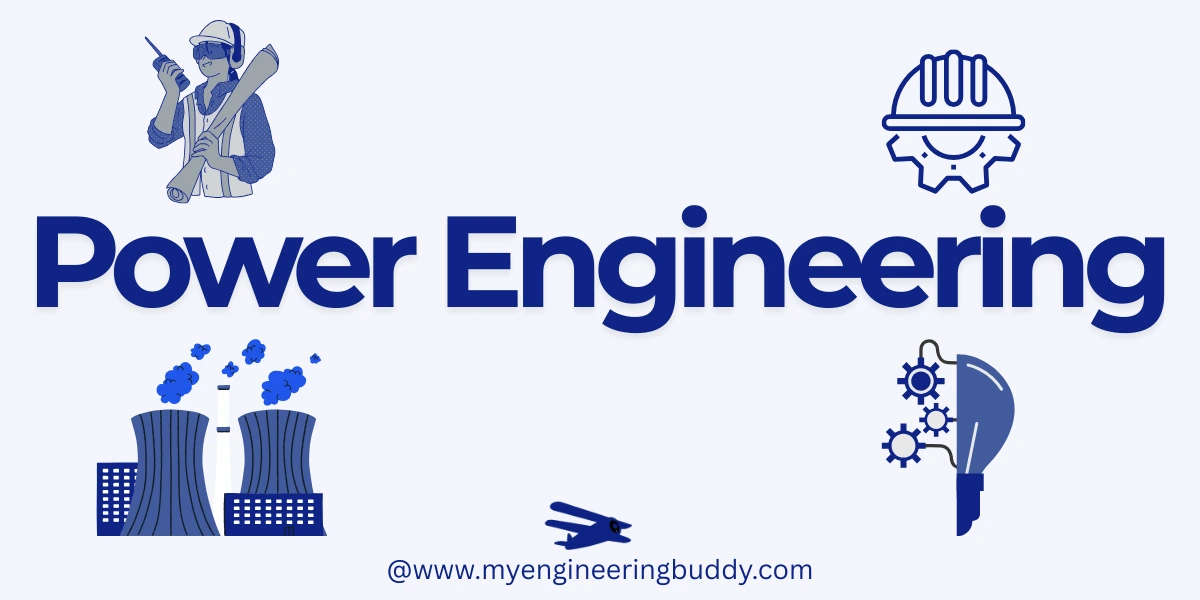
It was 3 AM. For Sarah, a second-year electrical engineering student, the world had shrunk to the size of her desk lamp’s glow. In front of her lay a problem set on three-phase power systems that looked more like ancient hieroglyphs than engineering. Her textbook was open, her notes were scattered, and a cold cup of coffee stood as a silent testament to a long, frustrating night. She understood the theory, kind of, but applying it felt like trying to solve a puzzle with half the pieces missing. This moment of despair is a familiar one for many students venturing into the demanding world of power engineering.
But what is this field that demands so much? And why is it more important today than ever before?
Simply put, power engineering is the invisible force that runs our modern world. It’s the magic behind the switch that floods a room with light, the silent hum that charges your phone, and the vast network that powers our cities, hospitals, and industries. It’s a subfield of electrical engineering that deals with the generation, transmission, distribution, and utilization of electric power. Think of it as the complete journey of electricity, from where it’s born to the moment you use it.
To truly grasp the scope of what power engineers manage, it helps to visualize the entire grid at a glance. The diagram below illustrates the complete path electricity travels to reach your home.
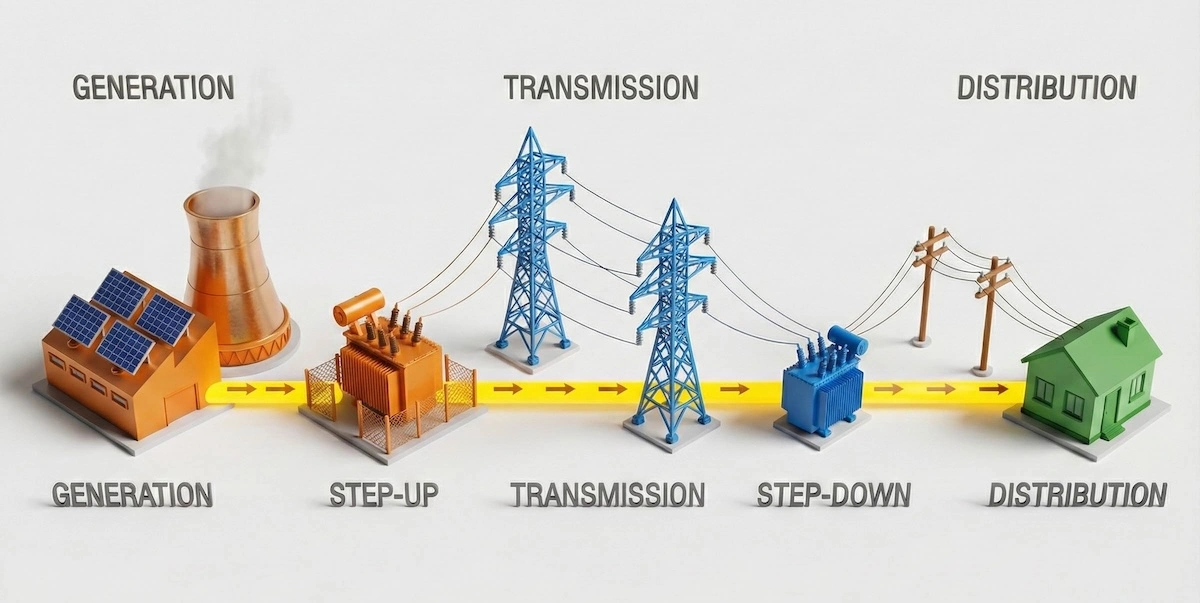
From generation to your home, power engineers manage every step of this critical electrical journey.
As you can see, every stage—from the generation plant to the distribution pole—requires specialized engineering to maintain stability.
The Lifeblood of Modern Society: Why Power Engineering Matters
We often take electricity for granted until it’s gone. A power outage can bring a bustling city to a standstill, highlighting our profound dependence on a stable and reliable power grid. Power engineers are the architects and guardians of this critical infrastructure.
Consider this staggering fact: According to the International Energy Agency (IEA), global electricity demand is projected to grow significantly, with much of that demand being met by renewables. This shift doesn’t just happen; it requires brilliant minds to redesign and manage our energy systems. The U.S. Bureau of Labor Statistics projects steady employment for electrical engineers, with a continuous need for professionals who can design and develop new electrical systems, including power generation equipment.
From integrating solar farms in the deserts of the UAE to designing offshore wind turbines in the North Sea and modernizing the aging power grids in the US and UK, the work of power engineers is truly global and deeply impactful. They are on the front lines of tackling climate change, ensuring energy security, and enabling technological progress.
A Day in the Life: What Do Power Engineers Actually Do?
The field is vast, but the work of a power engineer generally falls into a few key areas:
- Generation: This is where it all begins. Engineers in this sector design and operate power plants, whether they are traditional facilities using coal or natural gas, nuclear reactors, or increasingly, renewable sources like solar, wind, and hydropower.
- Transmission: Once electricity is generated, it needs to travel long distances from the power plant to cities and towns. Transmission engineers design the high-voltage power lines and towers that make up this “electrical highway,” ensuring minimal power loss along the way.
- Distribution: When the high-voltage electricity reaches a local area, it needs to be “stepped down” to a safer voltage for homes and businesses. Distribution engineers manage this local network of smaller power lines and transformers that bring power directly to your doorstep.
- Protection: Power systems are incredibly complex and vulnerable to faults like lightning strikes or equipment failure. Protection engineers design sophisticated systems of relays and circuit breakers that can detect a problem and isolate it in milliseconds, preventing catastrophic blackouts.
It is easy to get these sectors mixed up, but they have very different goals and technical requirements. Here is a quick breakdown of how Generation, Transmission, and Distribution compare side-by-side.
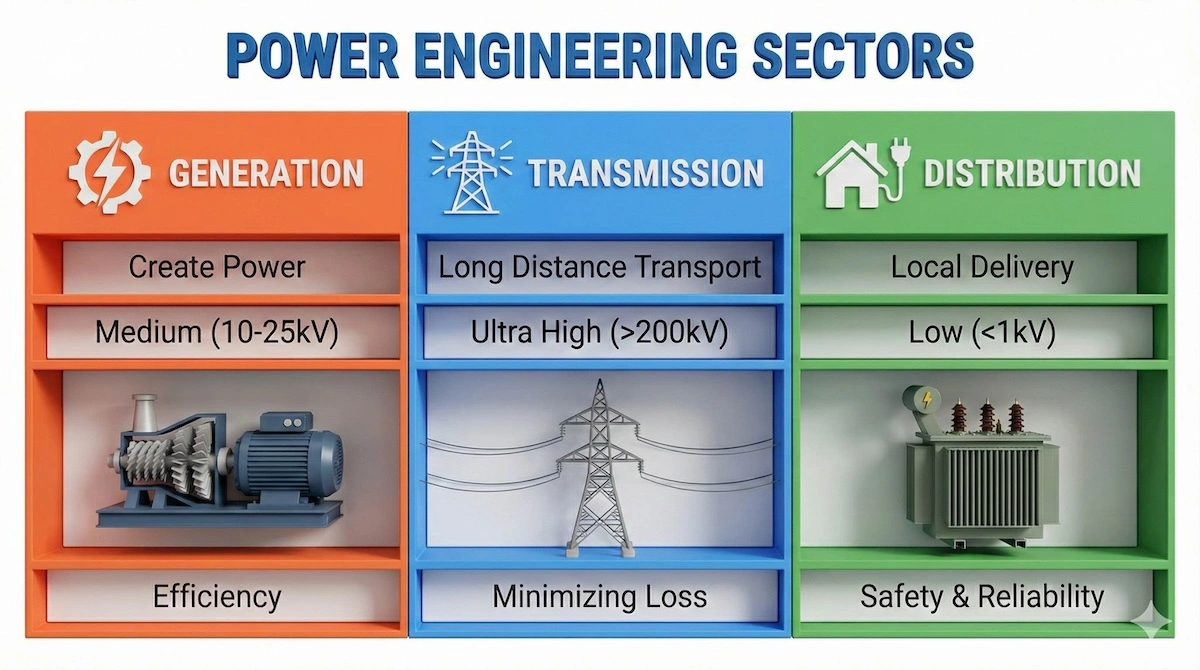
Understand the distinct roles, voltages, and goals of the three main pillars of power engineering.
Notice how the voltage levels drop significantly as power moves closer to the end-user—a critical safety challenge for distribution engineers.
The Spark of a Challenge: Why is Power Engineering So Tough?
So, back to Sarah at her desk. Why do so many bright students hit a wall with this subject? The difficulty often stems from a perfect storm of factors.
First, the concepts are highly abstract. You can’t see a magnetic field or hold a phasor diagram. Students must rely on complex mathematics—calculus, differential equations, and intricate algebra—to visualize and manipulate these invisible forces. It’s a mental marathon that requires a strong foundational understanding.
One of the first hurdles students face is understanding ‘Complex Power.’ If the math feels abstract, the classic ‘Beer Mug Analogy’ provides a perfect visual explanation of how Real and Reactive power work together.
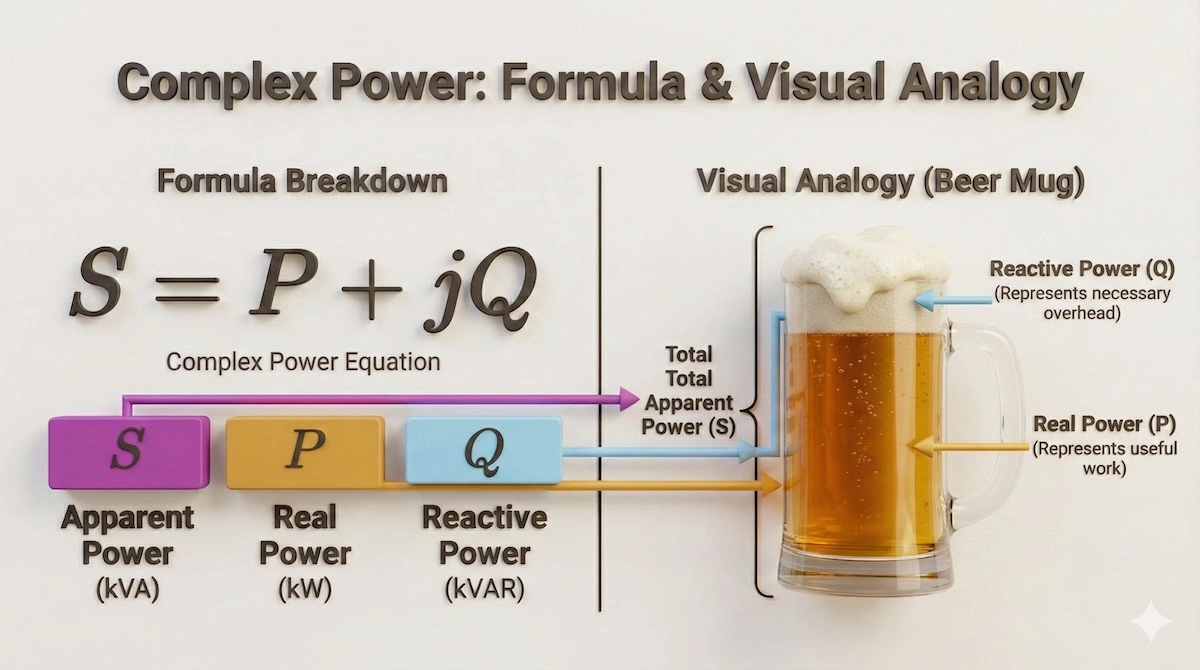
Visualizing abstract concepts like Complex Power helps bridge the gap between difficult math and reality.
Just as you pay for the whole mug (Apparent Power) but only drink the liquid (Real Power), engineers must manage the total energy flow even though only part of it does useful work.
Second, the scale is immense. You’re dealing with interconnected national grids, not just a simple circuit on a breadboard. A small change in one part of the system can have cascading effects miles away. This systems-level thinking can be a major leap for students accustomed to more isolated problems.
Finally, the curriculum is dense. Topics like power flow analysis, fault analysis, and machine theory are layered on top of each other, and falling behind in one area can make the next topic feel impossible. This is where Sarah was struggling; a small gap in her understanding of AC circuit theory was now causing a major roadblock in her three-phase systems assignment.
Navigating the Grid: Pathways to Success in Power Engineering
Feeling overwhelmed like Sarah is normal, but it’s not a dead end. Conquering this subject is achievable with the right strategy and support system. It’s about building a strong framework for learning, and sometimes, that means finding the right guide.
For beginners, a structured refresher on power engineering fundamentals can make complex topics click much faster. Many online courses and short modules map directly to common university topics and speed up the learning curve.
This is where high-quality Power Engineering teaching becomes absolutely critical. A great professor or mentor can translate abstract theories into tangible concepts, connecting the complex equations to real-world applications. They don’t just teach the “what”; they explain the “why.” A good Power Engineering teacher can make the difference between confusion and clarity, turning a student’s frustration into fascination.
Success in this field doesn’t happen by accident. We have mapped out the proven 5-step journey that takes students from confusion to career-readiness.
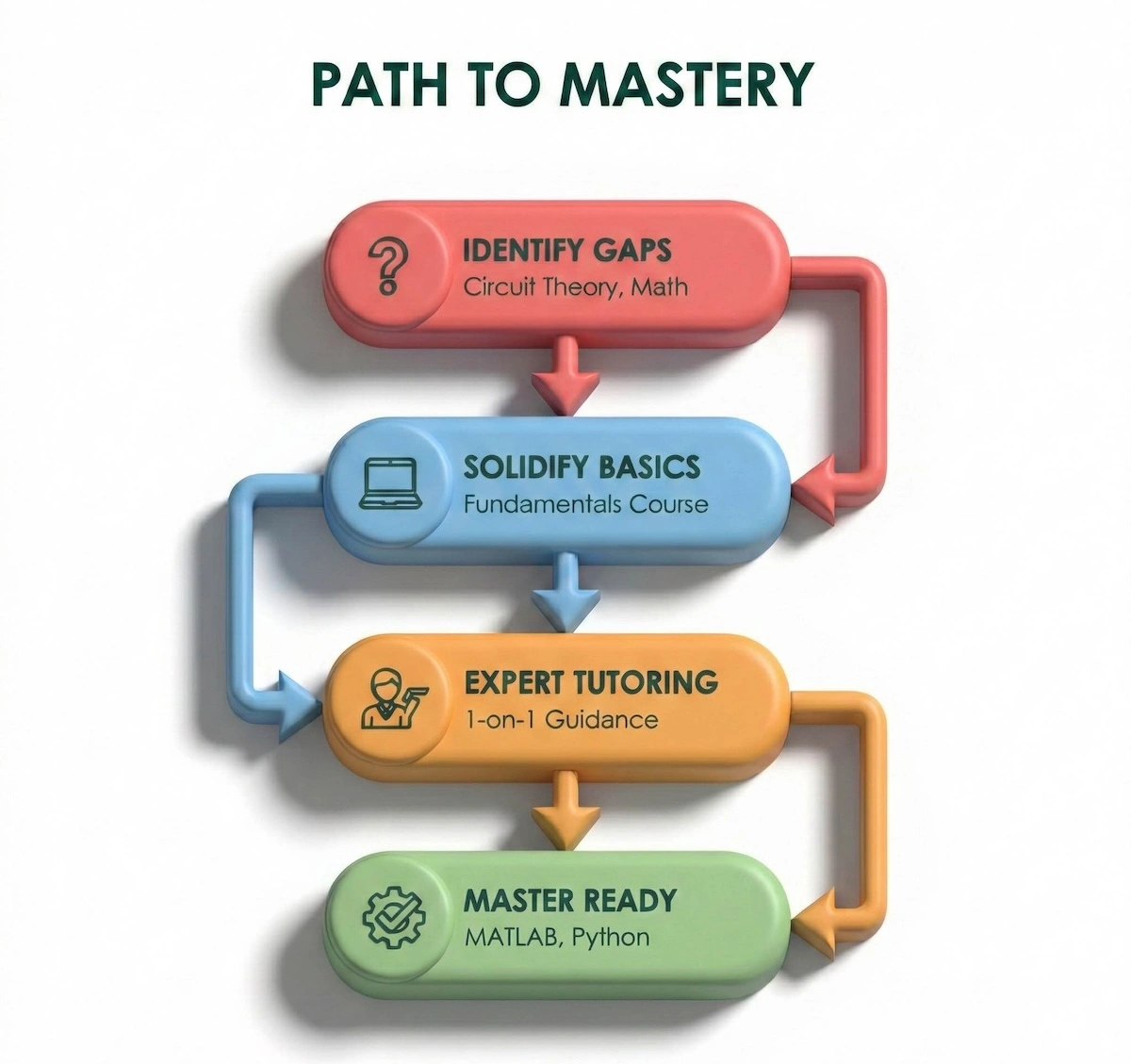
Follow this proven roadmap to navigate from academic struggle to a successful engineering career.
By following this structured path and seeking help when you hit a roadblock, you transform overwhelming challenges into manageable steps.
However, in a packed university lecture hall, getting that personalized attention isn’t always possible. That’s why many students turn to specialized support. Investing in Power Engineering tutoring can provide a focused environment to tackle specific problem areas. Working one-on-one with an expert allows a student to ask the “silly” questions they might be hesitant to voice in class and to work through problems at their own pace.
A dedicated Power Engineering tutor acts as a personal coach. They can quickly diagnose a student’s weak spots—just like Sarah’s gap in AC theory—and provide targeted exercises to strengthen that foundation. They’ve been through the curriculum, they know the common pitfalls, and they can offer shortcuts and study techniques that aren’t found in textbooks.
The Modern Classroom: Learning Without Borders
In today’s interconnected world, that expert help is more accessible than ever. The rise of Power Engineering tutoring online has been a game-changer for students everywhere, from busy campuses in the United States to international students in the Gulf. With flexible scheduling and a global pool of experts, finding the right mentor is no longer limited by geography.
Imagine being able to connect with a Power Engineering tutor online who has years of industry experience at a major utility company. This kind of interaction provides not just academic help but also invaluable career insights. Digital whiteboards, screen sharing, and live video make these online sessions just as effective, if not more so, than in-person meetings.
This accessibility is crucial when you’re buried under coursework. When a tough assignment is due, getting timely Power Engineering homework help can prevent an all-nighter and solidify understanding. A tutor won’t just give you the answers; they’ll guide you through the problem-solving process, empowering you to handle the next challenge on your own. This kind of targeted Power Engineering hw help is about learning the methodology, not just completing a task.
For larger projects and reports, which are common in upper-level courses, seeking Power Engineering assignment help can be equally beneficial. An expert can help you structure your analysis, verify your calculations, and ensure your work meets the high standards of a university-level engineering program. It’s about elevating the quality of your work and deepening your own learning in the process.
Ultimately, the journey through this challenging field is a personal one. For students who are serious about their careers and want to ensure they have a rock-solid understanding of the fundamentals, the decision to hire a Power Engineering tutor is a proactive step towards academic excellence and future success. It’s an investment in yourself and your ability to one day become one of the engineers who powers our world.
Sarah eventually sought help. She found an online tutor who patiently walked her back through the basics of phasor analysis. Suddenly, the hieroglyphs started to look like equations again. The puzzle pieces began to fit. It wasn’t magic; it was just targeted, expert guidance that illuminated the path forward. Her 3 AM frustration turned into a 10 AM moment of triumph when she finally solved the last problem. And in that moment, she wasn’t just a struggling student anymore; she was a future power engineer.
Frequently Asked Questions (FAQs)
Q1 Is power engineering a good career?
Yes, it’s a stable and essential field with a growing demand for skilled professionals worldwide.
Q2 What is the main focus of power engineering?
Its main focus is the safe and efficient generation, transmission, and distribution of electrical energy.
Q3 Do power engineers only work at power plants?
No, they also work for utility companies, consulting firms, government agencies, and in renewable energy sectors.
Q4 Is power engineering difficult to study?
It can be challenging due to its reliance on advanced math and abstract concepts, but it’s very rewarding.
Q5 Can I get help if I’m struggling with the coursework?
Absolutely, expert tutoring and academic support services are widely available to help students succeed.
Q6 Is coding important for power engineering?
Yes, proficiency in software like MATLAB and Python is increasingly important for system analysis and automation.
Related Subjects
Energy Storage Systems
Power System Protection
Power Transmission Systems
Smart Grid
Thermal Power Plants
******************************
This article provides general educational guidance only. It is NOT official exam policy, professional academic advice, or guaranteed results. Always verify information with your school, official exam boards (College Board, Cambridge, IB), or qualified professionals before making decisions. Read Full Policies & Disclaimer , Contact Us To Report An Error
